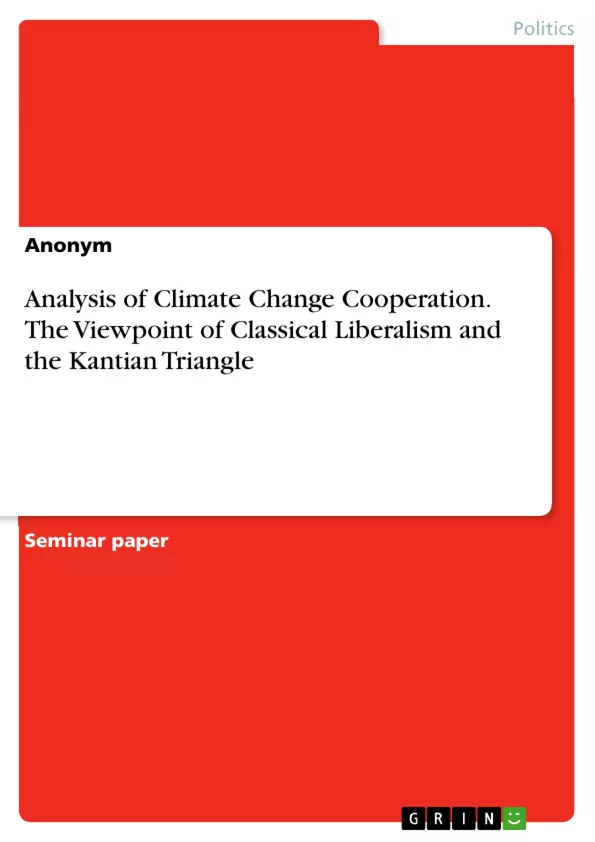Climate change is increasingly becoming a global challenge. This makes cross-border efforts and cooperation of nation states fundamental when searching for constructive and sustainable solutions. It shows relevancy for evaluating and analyzing the interdependencies and interactions between the actors involved. Hence, this paper aims to study the effect of climate change on international relations by examining its impact on the development of international organizations. In order to explain the connection between climate change and international organizations, the political theory of classical liberalism has been used.
A special tool applied was the Kantian triangle, which is based on Immanuel Kant’s liberal approaches to stability in global systems against the backdrop of classical liberalism. The triangle describes the pacifying effect of an interaction between democracy, economic interdependence and international organizations, which facilitates perpetual peace. Focusing on the factor of international organizations, a brief overview on institutions established and agreements made in order to halt climate change and reduce its implications will then be given at the end of the paper.
Table of Contents
- Abstract
- Table of Contents
- List of Figures
- List of Abbreviations
- 1 Introduction
- 2 Theoretical Groundwork of the Analysis
- 2.1 Kant's Approach to Classical Liberalism
- 2.2 Kantian Triangle
- 2.2.1 Perpetual peace: Interrelations with International Organizations, Democracy and Economic Interdependence
- 2.2.2 Interrelations between international Organizations, Democracy and Economic Interdependence
- 3 State of Affairs: Climate Change
- 3.1 Consequences of Climate Change
- 3.2 Tackling Climate Change
- 4 Liberal Point of View on Dealing with Climate Change
- 4.1 Responsibilities for Individual Engagement
- 4.2 Application of the Kantian Triangle on the Climate Change Crisis - Relationship between International Organizations and Climate Change
- 5 Conclusion
- Appendix
- Bibliography
Objectives and Key Themes
This paper examines the impact of climate change on international relations, specifically focusing on its effect on the development of international organizations. Using classical liberalism as a theoretical framework, particularly the Kantian triangle, it analyzes the relationship between democracy, economic interdependence, and international organizations in promoting global peace. The paper also provides an overview of institutions and agreements established to address climate change.
- The impact of climate change on international relations.
- The role of international organizations in addressing climate change.
- The application of classical liberalism, particularly the Kantian triangle, in understanding the connection between climate change and international organizations.
- The interrelationships between democracy, economic interdependence, and international organizations in promoting peace.
- An overview of institutions and agreements established to address climate change.
Chapter Summaries
- Introduction: This chapter sets the stage for the analysis, highlighting the increasing global challenge of climate change and the importance of international cooperation in finding sustainable solutions. It emphasizes the need to examine the interdependencies between actors involved.
- Theoretical Groundwork of the Analysis: This chapter delves into the theoretical foundation of the analysis, introducing Kant's approach to classical liberalism and the Kantian triangle. It explains how the triangle describes the interconnectedness of democracy, economic interdependence, and international organizations in achieving perpetual peace.
- State of Affairs: Climate Change: This chapter explores the consequences of climate change and the various efforts being made to address it. It focuses on the environmental, social, and economic impacts of climate change and the role of international cooperation in tackling the issue.
- Liberal Point of View on Dealing with Climate Change: This chapter analyzes the role of individual engagement and the application of the Kantian triangle to the climate change crisis. It highlights the relationship between international organizations and climate change in promoting global stability.
Keywords
This paper focuses on the impact of climate change on international relations and the role of international organizations in addressing this global challenge. It uses classical liberalism, particularly the Kantian triangle, as a theoretical framework to examine the interconnectedness of democracy, economic interdependence, and international organizations in promoting peace and stability. Key concepts include climate change, international organizations, international relations, classical liberalism, Kantian triangle, democracy, economic interdependence, and perpetual peace.
Frequently Asked Questions
What is the central theme of this paper on climate change?
The paper analyzes the impact of climate change on international relations, specifically focusing on the role and development of international organizations.
Which theoretical framework is used for the analysis?
The analysis is based on the political theory of classical liberalism and specifically utilizes the "Kantian triangle."
What are the three pillars of the Kantian triangle?
The three pillars are democracy, economic interdependence, and international organizations, which together are said to facilitate "perpetual peace."
How does the paper relate international organizations to the climate crisis?
It examines how international institutions and agreements are established to tackle climate change and how these efforts promote global stability.
Does the paper discuss individual responsibilities?
Yes, from a liberal point of view, it addresses the responsibilities for individual engagement in the context of global environmental challenges.
- Citar trabajo
- Anonym (Autor), 2020, Analysis of Climate Change Cooperation. The Viewpoint of Classical Liberalism and the Kantian Triangle, Múnich, GRIN Verlag, https://www.grin.com/document/537751



